Yum, Is This Really Iguana?
Local operator of pest removal company traps, removes – and eats – one of Florida’s most invasive species.
Harold Rondan, who makes his living from capturing one of Florida’s most invasive species, poses with his catch of the day, a common green iguana.
February 1, 2022
Cream cheese, jalapenos, celery, and sour cream are the base for a good smoked fish dip, a staple of South Florida cuisine. Harold Rondan’s dip is a little different. His main ingredient? Iguana.
“It tastes like chicken, believe it or not some people say it tastes like pork,” said Rondan.
Rondan owns and operates Iguana Lifestyles, a company dedicated to trapping and removing iguanas, which are a huge invasive species headache for the state of Florida. He’s removed them from backyards, rooftops, driveways— even toilets.
On average, he captures and removes 50 iguanas a day. That means he captures about 300 a week, or approximately 1,200 iguanas a month. That’s a lot of lizards. Rondan does one of two things with the reptiles, he either double bags the iguana bodies for garbage pickup, or he makes them his next meal.
“The tail is the filet mignon. [ It] has a flat layer of skin on top of it. Once you peel off the first layer, there is just a nice piece of fat and that’s the best part to me,” said Rondan.
He makes a variety of recipes that incorporate iguana. From hamburgers to meaty rice to spaghetti and meatballs, any recipe that he gets his hands on, he makes them iguana style.
“Red curry is my second best dish. Everyone loves it,” said Rondan.
Like many other people who worked in the tourist travel industry, Rondan lost his job as a hotel manager due to the pandemic.
“Losing my job to the pandemic was one of the most scariest times of my life. Once I was let off, I did not know what direction to go,” said Rondan.
With all this free time on his hands, he started watching YouTube channels on how to catch iguanas. Even though he has never had an interest in them, he saw an opportunity in helping Florida rid itself of the pesky reptile and found a new way to make a living for himself.
Although his company is based in North Miami Beach, FL, he gets calls from clients statewide either needing to come to remove them or who want to learn how to hunt them themselves.
“I’ve gotten so many phone calls from people who want guides, so I take groups of four or five people and we go hunting and act like a guide [to the clients],” said Rondan.“They are giving back to Florida and they get to hunt so it is a win, win situation for both.”
Even though he has three people on his team, Rondan is the one that does the physical work. Usually, he charges a base fee of $100 to $200 based on location and then $25 to $50 per iguana depending on size and type. The first thing he does when he wakes up, he checks his phone for client calls. On average, he gets 30 calls a day.
First documented in Miami-Dade County in the 1960s, in the last couple of years, more than 20,000 iguanas have been reported to Florida Fish and Wildlife Conservation Commission (FWC).
“The introduction of iguanas is the result of human activity, which may be unintentional, a hitchhiker on a cargo shipment, or intentional, escape or release of pet iguanas,” said Jan Fore, Nonnative Fish and Wildlife Education and Outreach Coordinator.
As with any invasive species, they cause a lot of damage. Including structural and environmental damage, Fore points out that iguanas frequently dig burrows which cause destruction to roadways, seawalls, and water control structures.
According to a research study by the University of Florida, green iguanas use the burrows of native animals such as burrowing owls and gopher tortoise, both of which are listed as endangered species by Florida.
Rondan has seen the damage up close and agrees. He says iguanas eat small vertebrates and bird eggs, which is a big worry to native species like the burrowing owls. He has witnessed iguanas burrowing down as much as 17 feet to eat the eggs of the fragile feathered friends.
“You guys [Hollywood, FL] are protecting the burrowing owls but, there is no solution because if you go by every burrowing hole, you’ll see a Mexican spiny tail [iguana],” he said.
Recently, Florida has recognized the problems an exploding iguana population has caused. So, in 2019, FWC announced that iguanas are no longer protected under Florida’s anti-cruelty law, and allowed residents or contractors to humanely kill on private property with landowners’ permission.
Rondan uses two methods to trap iguanas: he uses a telescope fishing pole affixed with a snare at the end of it or a live trap. When he goes on the job, he first uses the homemade snare pole, extending it out as far as 20 to 22 feet so as not to startle the iguana. If that doesn’t work, he next uses a regular live trap, a much slower method. He sets it with seasonal fruit and then has to wait for the iguana to walk in. If all else fails, and if the client agrees to it, he has an air rifle equipped with special rubber bullets to kill the iguana on contact.
Although it is a step in the right direction, Rondan and other companies like his are really swimming against the tide. For example, iguanas are cold-blooded and as Florida winter sets in, they are known to freeze to death and fall out of trees. But, this year those who despise iguanas are not going to be too happy.
“They are no longer staying in the trees when it gets cold,” said Rondan. “ Now, they know it’s cold and they are going to their dens with the females and are bundling up together as a heat source.”
He thinks eating them may be the best possible solution and some Florida residents agree. Rondan mentions a petition calling for iguana meat to be FDA approved, which means it can be sold through meat markets. As of right now, iguana’s cannot be sold for consumption, but recently meat sales have been approved in Puerto Rico.
“So instead of us wasting iguana meat, we want to be able to sell it. This would create a new market and jobs for people here in South Florida. It’s much better than just throwing away and letting it go to waste,” he said.
Let’s lift up our fork and knife and put an end to this problem.

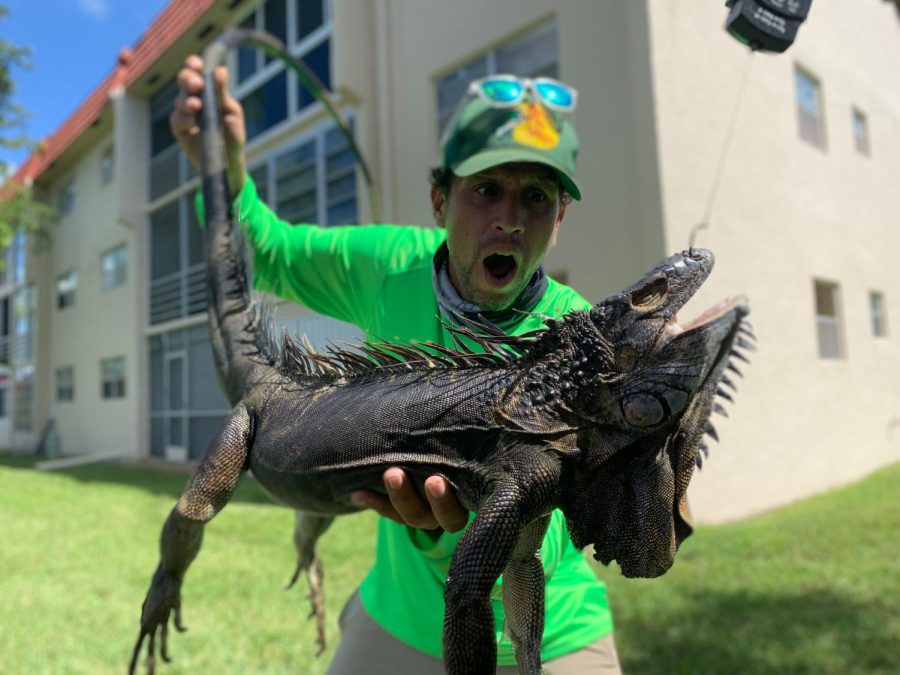
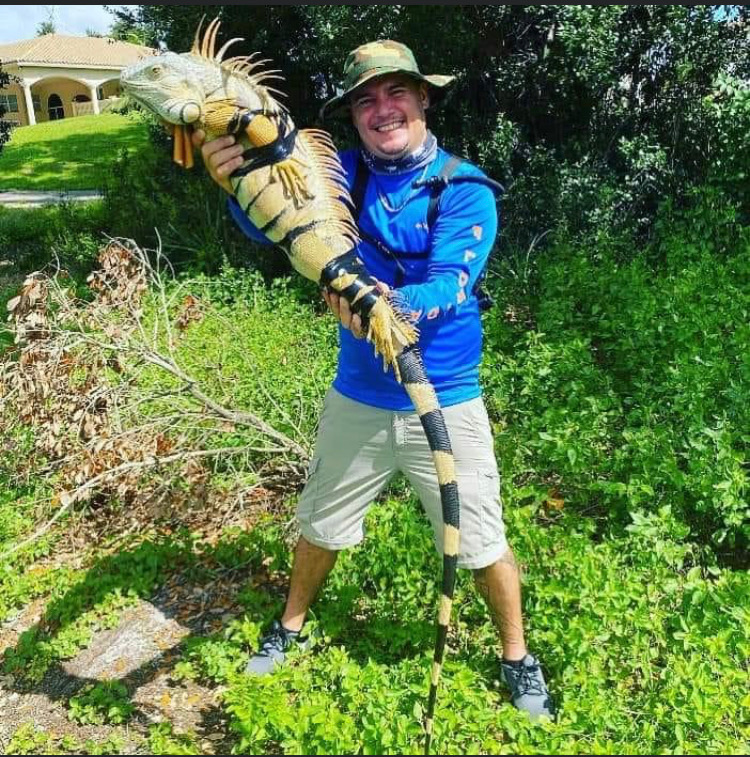

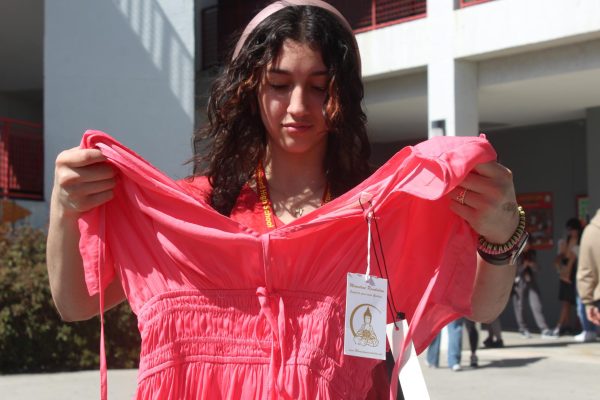
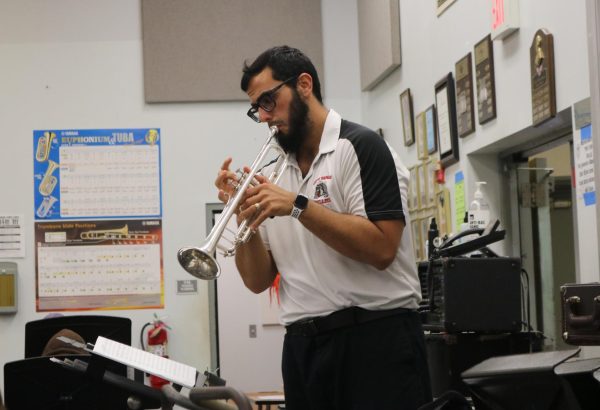
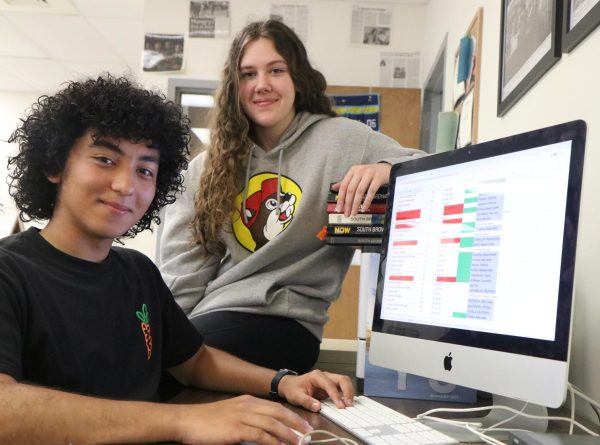






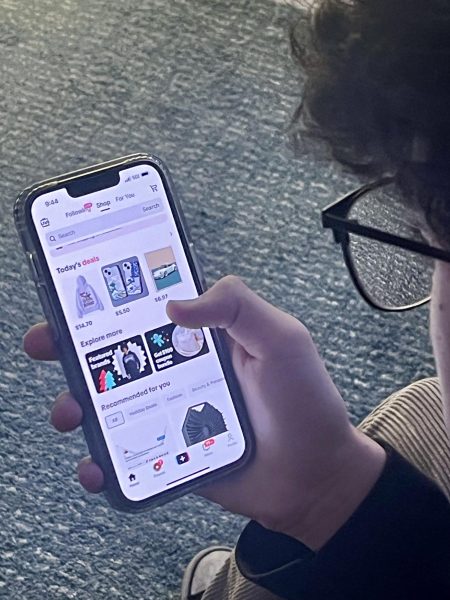
The Iguana guy • Feb 3, 2022 at 12:09 pm
Amazing job. Such a great Article